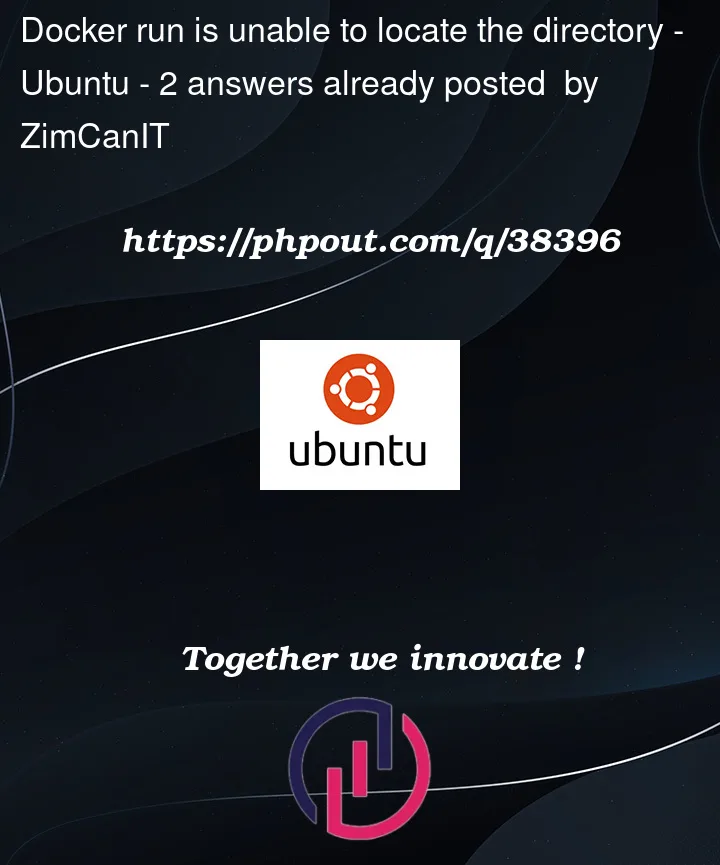I’ve built a docker image, docker build -t dockeragent:latest . but can’t seem to trigger the container to run. The command: docker run -e AZP_URL=<obfuscate> -e AZP_TOKEN=<obfuscate> -e AZP_AGENT_NAME=mydockeragent dockeragent:latest produces the following error: exec ./start.sh: no such file or directory.
I understand that the start.sh script is called by the Dockerfile and I’ve ensured that the Dockerfile is in the same directory as the start.sh script. I’ve also tested referencing the start.sh script by using interpolation to point to the absolute path pointing to the start.sh script. Example:
ENTRYPOINT [ "${pwd}/start.sh" ]
Any ideas on what parameter has been misconfigured? The files are directly copied from Micorosft’s guide on building self-hosted agents with Docker
For reference, please see the below Dockerfile and associated start.sh
Dockerfile
FROM ubuntu:20.04
RUN DEBIAN_FRONTEND=noninteractive apt-get update
RUN DEBIAN_FRONTEND=noninteractive apt-get upgrade -y
RUN DEBIAN_FRONTEND=noninteractive apt-get install -y -qq --no-install-recommends
apt-transport-https
apt-utils
ca-certificates
curl
git
iputils-ping
jq
lsb-release
software-properties-common
RUN curl -sL https://aka.ms/InstallAzureCLIDeb | bash
# Can be 'linux-x64', 'linux-arm64', 'linux-arm', 'rhel.6-x64'.
ENV TARGETARCH=linux-x64
WORKDIR /azp
COPY ./start.sh .
RUN chmod +x start.sh
ENTRYPOINT [ "./start.sh" ]
start.sh
#!/bin/bash
set -e
if [ -z "$AZP_URL" ]; then
echo 1>&2 "error: missing AZP_URL environment variable"
exit 1
fi
if [ -z "$AZP_TOKEN_FILE" ]; then
if [ -z "$AZP_TOKEN" ]; then
echo 1>&2 "error: missing AZP_TOKEN environment variable"
exit 1
fi
AZP_TOKEN_FILE=/azp/.token
echo -n $AZP_TOKEN > "$AZP_TOKEN_FILE"
fi
unset AZP_TOKEN
if [ -n "$AZP_WORK" ]; then
mkdir -p "$AZP_WORK"
fi
export AGENT_ALLOW_RUNASROOT="1"
cleanup() {
if [ -e config.sh ]; then
print_header "Cleanup. Removing Azure Pipelines agent..."
# If the agent has some running jobs, the configuration removal process will fail.
# So, give it some time to finish the job.
while true; do
./config.sh remove --unattended --auth PAT --token $(cat "$AZP_TOKEN_FILE") && break
echo "Retrying in 30 seconds..."
sleep 30
done
fi
}
print_header() {
lightcyan='33[1;36m'
nocolor='33[0m'
echo -e "${lightcyan}$1${nocolor}"
}
# Let the agent ignore the token env variables
export VSO_AGENT_IGNORE=AZP_TOKEN,AZP_TOKEN_FILE
print_header "1. Determining matching Azure Pipelines agent..."
AZP_AGENT_PACKAGES=$(curl -LsS
-u user:$(cat "$AZP_TOKEN_FILE")
-H 'Accept:application/json;'
"$AZP_URL/_apis/distributedtask/packages/agent?platform=$TARGETARCH&top=1")
AZP_AGENT_PACKAGE_LATEST_URL=$(echo "$AZP_AGENT_PACKAGES" | jq -r '.value[0].downloadUrl')
if [ -z "$AZP_AGENT_PACKAGE_LATEST_URL" -o "$AZP_AGENT_PACKAGE_LATEST_URL" == "null" ]; then
echo 1>&2 "error: could not determine a matching Azure Pipelines agent"
echo 1>&2 "check that account '$AZP_URL' is correct and the token is valid for that account"
exit 1
fi
print_header "2. Downloading and extracting Azure Pipelines agent..."
curl -LsS $AZP_AGENT_PACKAGE_LATEST_URL | tar -xz & wait $!
source ./env.sh
print_header "3. Configuring Azure Pipelines agent..."
./config.sh --unattended
--agent "${AZP_AGENT_NAME:-$(hostname)}"
--url "$AZP_URL"
--auth PAT
--token $(cat "$AZP_TOKEN_FILE")
--pool "${AZP_POOL:-Default}"
--work "${AZP_WORK:-_work}"
--replace
--acceptTeeEula & wait $!
print_header "4. Running Azure Pipelines agent..."
trap 'cleanup; exit 0' EXIT
trap 'cleanup; exit 130' INT
trap 'cleanup; exit 143' TERM
chmod +x ./run-docker.sh
# To be aware of TERM and INT signals call run.sh
# Running it with the --once flag at the end will shut down the agent after the build is executed
./run-docker.sh "$@" & wait $!
Thanks in advance!




2
Answers
Check the Dockerfile and Start.sh file. The settings should be correct.
Refer to this doc: Linux Docker container agent
The start.sh need to use
Linux LFline endings when creating Linux Docker Container Agent.When you create the start.sh in windows system, it will use
Windows CRLFline endings.You can convert the Start.sh file from Windows CRLF to Linux LF in this Online site: LF and CRLF converter online Then you can run the same command to create the Pipeline agent.
Or you can directly create the files in Linux system.
You can run this and exec into pod check you run file start.sh